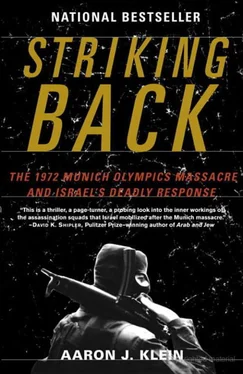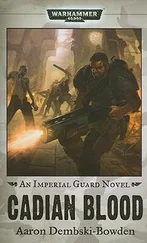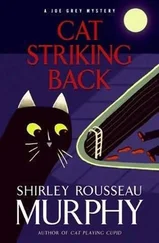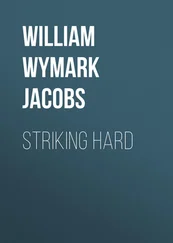The gunfire that almost killed Skolsky was the same gunfire that roused Lalkin.
Back in Apartment 1, the terrorists herded the six hostages into a second-floor bedroom and began binding them with the precut rope they had brought with them. They marched Gutfreund to the corner of Apartment 1, keeping a weapon trained on his face. They yanked the other five from their beds: Amitzur Shapira, a forty-year-old track and field coach and father of four; Kehat Shorr, fifty-three, the marksmen’s coach; Andrei Spitzer, twenty-seven, the newly married fencing coach and father of a one-month-old daughter; Yaakov Springer, fifty, a weight lifting referee officiating at his fifth Olympic Games; and Moshe “Moni” Weinberg, thirty-three, the wrestling coach and father of a newborn son. Unlike the rest of them, Weinberg was not drowsy. He had just sneaked back into the apartment after a night out with friends in Munich. A strong man, used to close-quarter battle, Weinberg lunged at Issa, knocking him off his feet. But before he could grab his weapon, a second terrorist, acting instinctively, shot a single round that ripped through his right cheek. Blood poured from his mouth, staining his clothes and the floor beneath his feet. The terrorists pushed the hostages into Shorr and Spitzer’s room on the second floor. They were all bound at the wrists and ankles.
The men sat stunned on the two simple beds, most of them in their underwear. Issa and two of the masked men remained with the hostages, guns pointed at their heads. Tony, the second in command, and the four other terrorists took Weinberg with them and set out to find more Israelis. Outside they passed by Apartment 2, housing five Israeli track and field athletes, and charged into Apartment 3. Weinberg, bleeding, was forced to lead the terrorists through the apartment complex to the Israeli rooms, an AK-47 at his back. Despite everything, he kept his head clear. Apartment 3 housed the wrestlers and the weight lifters. Weinberg, their coach, must have reasoned that the big boys had the best chance of overpowering the terrorists.
Tony and his men surprised the athletes who shared the two floors of Apartment 3: David Berger, twenty-eight, American-born weight lifter; Eliezer Halfin, twenty-four, lightweight, Soviet-born wrestler; Mark Slavin, eighteen, Greco-Roman wrestler, also from the former Soviet Union and the youngest member of the Israeli delegation; Yossef Romano, thirty-two, middleweight, Libyan-born weight lifter, and father of three girls; Ze’ev Friedman, twenty-eight, a featherweight, Polish-born weight lifter; and Gad Tsabari, a light flyweight freestyle wrestler. The terrorists quickly pulled the athletes out of bed. Shouting and butting them with their weapons they corralled the Olympians in the living room on the first floor. While three of the terrorists kept the athletes under watch, one of them looked under beds and in closets for hiding Israelis. David Berger, who held a law degree from Columbia University, turned to his friends and whispered, in Hebrew, “Let’s charge them, we’ve got nothing to lose.” One of the terrorists caught the whisper and immediately slammed the barrel of his weapon into Berger’s back, shutting him up and stymieing, for the time being, any chance of a revolt.
Yelling and jabbing, the terrorists forced the athletes into a straight line with hands clasped on their heads. They marched them outside, back in the direction of Apartment 1. Wrestler Gad Tsabari, weighing less than 106 pounds, was first in line. As they walked through the blue door into the foyer of Apartment 1, one of the terrorists, a ski mask covering his face, directed Tsabari into the apartment with a jerk of his gun. “I was dazed and sweaty,” Tsabari recalled. “Without thinking too much I slapped aside the barrel of his weapon and ran outside.” He took the winding stairs down to the underground parking garage in giant leaps. One of the terrorists followed him down the stairs and fired a few quick shots in his direction. But Tsabari, who zigzagged and took cover behind the pillars of the building, remained unscathed.
Moshe Weinberg, the wrestling coach, stood farther down the line. He held a piece of cloth to his injured cheek as they marched outside the apartment complex. While Tsabari was running through the underground garage, Weinberg took advantage of the momentary distraction and made a move for one of the terrorist’s guns. His sudden movement alerted one of the other terrorists, who released a long burst of fire, stopping Weinberg in his tracks and ripping his chest apart. The remaining hostages were shoved into Apartment 1 without further incident. Less than ten minutes had elapsed.
The village woke up to the long, thumping burst of gunfire that killed Weinberg. Lights went on in rooms, heads poked out of windows. Lalkin jumped out of bed. The major now knew this was not accidental fire. Nothing could have prepared him for what he saw beneath his window. On the sidewalk, outside Apartment 1, Weinberg lay lifeless, his clothes soaked in blood.
Lalkin looked to his right and saw Henry Hershkowitz, the flag bearer at the opening ceremony, gaping out the window of Apartment 2. The two of them watched an Oly make his way toward the building, walkie-talkie in hand. Minutes before, a call from a cleaning woman had alerted the authorities to the sound of gunfire. At 0450 hours the security shift manager sent a guard to check the scene. The guard saw Weinberg’s body splayed on the ground and one of the terrorists near the blue door. He turned to the armed terrorist for an explanation, but got no response. The unarmed Oly radioed back to headquarters, describing what he had seen.
Lalkin raced to the first-floor living room, to the only phone in all of the Israeli housing units. He knew part of his delegation had been seized and that at least one member was dead. He got an outside line and called the Sheraton Hotel, where all the Israeli journalists and Olympic officials were staying. “Call Israel!” he said. “Arab terrorists have taken part of our delegation hostage.”
Again, he looked out the window: several unarmed guards had congregated outside Apartment 1. He patted his hip, where the firearm he had been refused might have been resting. He thought for a moment how much safer he would feel if he had a gun. He rechecked the lock on the door and went back to the phone, maintaining his connection with the outside world. Remembering his son’s pleas to stay with the wrestlers in Apartment 3 brought a wave of nausea. He chased the thought from his mind.
Meanwhile, in the room where the hostages were being held, wrestler Yossef Romano, who had torn tendons in his knee and was using crutches, began to contemplate a desperate move. He had witnessed Weinberg’s attempt to seize a weapon, had seen him killed; nevertheless, he lunged at one of the terrorists, grabbing for his gun. He managed to put the terrorist flat on his back but was shot by another one of the hostage takers. Romano’s dead body was left in the center of the living room. Nine hostages remained.
The phone rang in Manfred Schreiber’s apartment shortly after 0500 hours. Schreiber, a solidly built man in his late forties, was the all-powerful chief of the Munich police, responsible for planning and running security at the Olympic Games. He immediately ordered the village guards to isolate the Israeli dorms and lock the gates to the village, preventing anyone from entering or leaving. He placed one call, to Bruno Merck, before leaving his house. Merck, the interior minister of Bavaria, contacted Hans-Dietrich Genscher, the German interior minister. Within an hour, all of West Germany’s top officials had been updated. They were stunned, embarrassed, and, primarily, uncertain how to proceed.
Police were sent to the home of Olympic Village mayor Walter Troeger to wake him and escort him to the scene. The smooth politico was completely unprepared for what awaited him. Just after 5:30 A.M. the authorities scooped Moshe Weinberg’s lifeless body off the sidewalk outside Apartment 1 and placed it in an ambulance. On September 5, 1972, the people of Munich awoke to the sound of sirens and the rumble of dozens of military trucks. Flickering police lights painted the city blue at dawn.
Читать дальше












